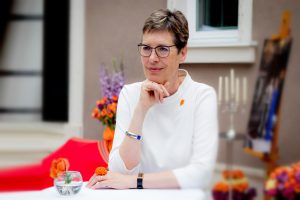Bilateral relations between the Netherlands and Croatia are an example of a constructive and fruitful dialogue which allows both countries to nourish their friendship, economic cooperation and cultural exchange.
Excellent, friendly and constructive – that is how H.E. Ms Ellen Berends, Ambassador Extraordinary and Plenipotentiary of the Netherlands, describes bilateral relations between Croatia and her country. For more than a quarter of the century, the two countries have been working on improving their relations in political, economic and cultural sphere.

The results are impressive and easily measurable: today, the Netherlands is the biggest investor in Croatia with a lot of untapped potential. Croatia’s membership in NATO and the European Union has further fortified these relations, but also a lot of credit should be given to the constructive dialogue at the bilateral level and the energy the two sides invested in making good things even better in big and in, seemingly, small ways.
For example, in May, the Embassy will organize a tulip exhibition in Split, and the traditional Orange Bike Ride in Zagreb bringing Dutch values closer to the Croatian public in a charming and energising manner. Bearing in mind that the Netherlands chose to devote the entire 2018 to promote peace, justice, human rights, freedom, tolerance, and diversity, the Embassy will be specifically working on promoting these values throughout the year. As a symbolic gesture, all guests at the King’s Day celebration in Croatia will receive a little bag with multicoloured poppy seeds, which represent peace, so that they can plant them in their back garden and get inspiration from these seeds for their everyday activities.
Indeed, Croatia can learn a lot from the Netherlands in building its young democracy and market economy. The Dutch people stand out for their tolerance and openness toward diversity – almost one quarter of the Netherlands’ population have non-Dutch roots. Multiculturalism and mutual understanding flourishes due to a pragmatic approach to problem solving in which all sides look for consensus-based decision making and the win-win outcomes. In short, in the words of the ambassador Berends, “we see diversity is an asset.”
Croatia can find a lot of inspiration in the Netherlands in making its own business environment even friendlier and more appealing to Dutch greenfield investors which are still shy from going deeper into the Croatian economic landscape. Contrary to fears that many young economies stepping into the EU market harbour, that they might suffer if they open their borders and liberalise trade, by its own example, the Netherlands tells a different story. The country has the most competitive economy in the EU and it is the 6th most appealing country in the world in terms of incoming FDI, which is built upon the idea that only a very open and competitive economy with very few state companies can attract fresh capital. Business information is transparent and easy to obtain and the logistics is state-of-the-art. While it is not an easy task to achieve such results from the point of view of a young EU member such as Croatia, it is definitely a path to be followed. “We are sharing our experiences with Croatia, amongst others via bilateral cooperation programmes between our ministries of economy and finance”, says ambassador Berends, adding that the Netherlands intends to continue supporting Croatia in the future.

Learning by example is not an activity which can be carried out only at the level of bilateral relations or through business encounters. Dutch tourists have explored Croatia beyond Dubrovnik, and as the statistics show, they cherish everything Croatia has to offer as a country which puts a lot of effort in cultivating and endlessly upgrading its leisure industry, cultural and gastronomic potentials. In the experience of ambassador Berends, the interest is mutual, with many Croatian citizens expressing positive views of the Netherlands.
-
The bilateral relations between the Netherlands and Croatia date back 26 years. How would you assess these relations today and how much have they changed since Croatia became an EU member?
Our bilateral relations started off with the recognition of Croatia’s independence. We first focused on supporting Croatia on its journey towards the European and Transatlantic integration. After Croatia’s accession to NATO and later the EU, we started cooperating as good partners in these organisations and extended our bilateral relations. Our cooperation today is excellent, friendly and constructive. The Netherlands is a big investor in Croatia and a growing number of Dutch tourists favour Croatia as a holiday destination.
-
The Netherlands tops the list of the biggest foreign investors in Croatia. How many Dutch companies are investing in Croatia and in what areas?
The Netherlands is indeed the biggest investor in Croatia: it has made € 2.7 billion worth of investments since 1993, including investments from branch offices of foreign companies established in the Netherlands. The Dutch greenfield investments in Croatia are still limited and would benefit from a further improvement of the business climate in Croatia.
-
What does Croatia lack in terms of attracting even more investments and what systemic problems are the investors here facing according to the feedback you get from them?
Let me turn your question around and explain why the Netherlands is the first and most competitive economy in the EU and the 6th country in the world in terms of incoming FDI. Our economy is very open and competitive, with very few state companies. Business information is transparent and easy to obtain. Logistics and infrastructure are hard to beat, as is the legal environment. Labour productivity is one of the highest in the world and our living conditions are pleasant – though our weather is not as sunny as Croatia’s! Last year, we attracted almost 360 foreign companies, contributing some € 1.7 billion to the economy. In total, foreign companies in the Netherlands and their suppliers employ 1.4 million people, almost 20% of all jobs.
We are sharing our experiences with Croatia, amongst others via bilateral cooperation programmes implemented by our ministries of economy and finance. We are happy with the results and will continue to support Croatia in the future.
-
The Dutch Embassy and you personally have been investing a lot of energy into new projects. What projects would you like to single out at this moment and why are they important?
Yes, we are engaged in many projects. In May, we will organize a tulip exhibition in Split, for example, and hold the traditional Orange Bike Ride in Zagreb. Most of our activities this year are inspired by the fact that the UN Declaration for Human Rights was adopted 70 years ago, and that the Netherlands is currently member of the UN Security Council. In that capacity, we are actively contributing to international peace and security.

Justice, peace and human rights cannot be simply declared by a government or adopted by a parliament – they must be secured, developed and defended by the people as well. That requires continuous work, in an old and established democracy such as my own country, and in a young democracy like Croatia, as well as in all other countries in the world. That is why the Embassy pays special attention to topics like peace, justice, human rights, freedom, tolerance, and diversity this year. All our guests for our King’s Day celebration will receive a little bag with multicoloured poppy seeds, which are a symbol of peace, so we can all sow peace in our back garden!
5. The Netherlands has a long history of having inclusive political and economic institutions with a very interesting side effect – growing tolerance. What geographic, historical, economic and political structures have made the Netherlands a tolerant country, and what tolerance and mutual respect mean to the country?
Inclusiveness and tolerance are at the core of the Dutch culture. They can be traced back to geographical and historical reasons. The Netherlands is basically a delta, so the Dutch always had to work together in their struggle against water – whether they liked each other or not. The fact that the country is very flat led and leads to easy and frequent interaction with other peoples and cultures. The establishment of a republic ran by merchants, many centuries ago, strongly influenced the political culture. Discrimination is not only bad for principled reasons, but for economic reasons too.